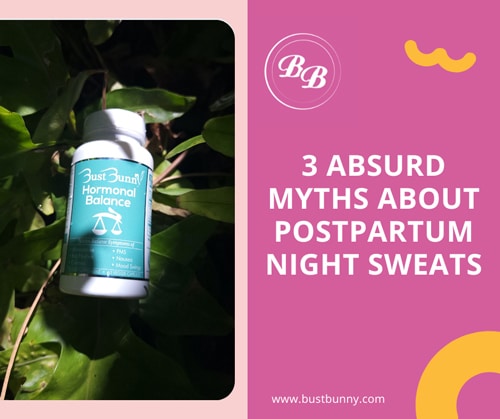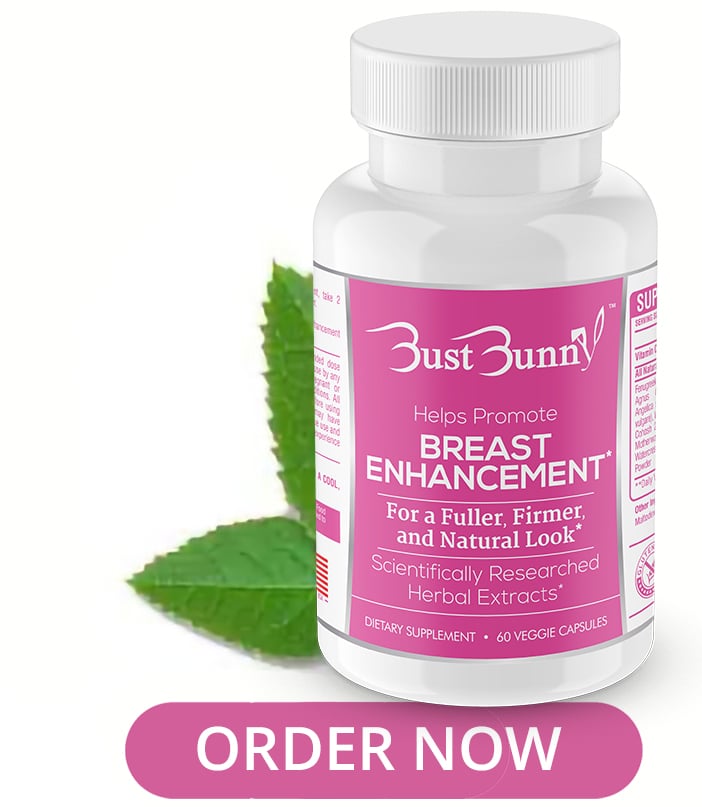If you’re a new mom who often startles awake, shivering in a pool of sweat, you’re not alone. Postpartum night sweats happen to about 30% of newly delivered mothers for varied lengths of time depending on how soon they restore their hormonal balance.
That said, it’s challenging to weed out the myths about postpartum night sweats from the facts about their causes, duration, and potential remedies.
We understand that you’ve got your hands full with parenting and need all the sleep you can get, minus night sweats. So, let’s lighten the load.
We want to debunk the myths surrounding postpartum night sweats and give you information to help you better weather those episodes and improve your quality of sleep.
We’ll shed light on:
- Three common misconceptions about night sweats and the underlying truths
- Why naturally balancing your hormones is the key to dealing with postpartum night sweats
- What other accessible ways there are to ease night sweats
Myth 1 – Postpartum Night Sweats Result From High Ambient Temperature
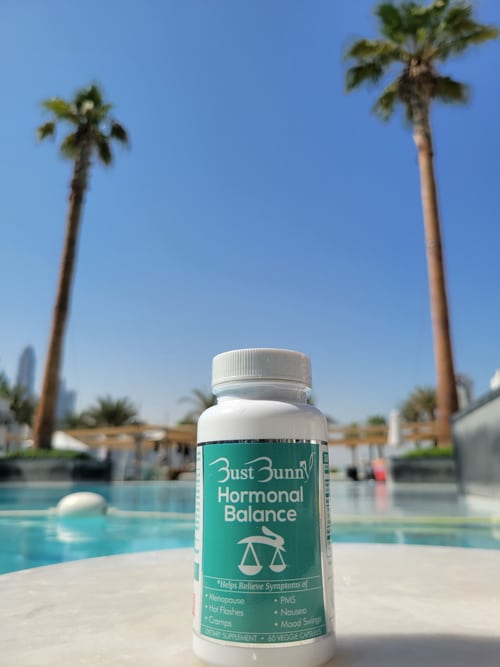
Moms’ forums and resources often focus on externals, such as keeping the bedroom temperature low or wearing light pajamas to ease night sweats. While these hacks help, they are superficial and center the solution to postpartum night sweats on incidental externals.
Myth Busting
Many new moms still wake up drenched in sweat in the dead of winter. This is primarily because of the drastic change in hormone levels rather than any external causes.
During pregnancy, the levels of the reproductive hormones, estrogen and progesterone, are increased to support a healthy pregnancy.
However, after placenta delivery, estrogen and progesterone levels crash dramatically, setting off a domino effect across the hormonal system. In addition, prolactin, the hormone that enables you to produce milk, further suppresses postpartum estrogen levels.
While further studies are needed to fully understand this hormonal cascade, here’s what we know:
- The dramatic dip in estrogen and progesterone after delivery causes a hormonal crash and impacts several other hormones across the board.
- Low estrogen lowers the levels of other hormones that regulate sleep (melatonin) as well as breathing and body temperature (serotonin). Both serotonin and melatonin peak at night and are reliant on good quality sleep.
- Poor sleep and low estrogen cause a stress reaction in the body, triggering higher stress hormone levels (cortisol and noradrenaline), which spike body temperature leading to night sweats.
- Prolactin increases after birth to stimulate the production of milk and further suppresses estrogen in the body, worsening the above effects.
- To crown it all, the body needs to sweat more to eliminate all the extra fluid retained during pregnancy from increased blood volume and water needs during pregnancy.
Our hormones are more like an orchestra than a solo player. Each hormone’s role feeds into the others. Consequently, an imbalance in one hormone derails the whole system.
Remember, it may take the body anywhere from a few weeks to a few months or even years to reset your hormones.
In the meantime, what can you do to remedy the night sweats?
- Eat healthy fats, including omega-3s from oily saltwater fish—for example, tuna and salmon—to help regulate hormone production. Healthy fats and lean proteins will also stabilize your blood sugar, balance hunger hormones, and reduce stress levels.
- Reduce stress hormones in the body through regular exercise, which can be as simple as a daily 30-minute walk outdoors.
- Employ easy hacks to keep cool, dry, and comfortable at night. For example:
- Keep cold water by the bedside to hydrate throughout the night.
- Sprinkle on some talc-free powder to soak up the sweat and prevent heat rash.
- Wear natural fabrics that allow the skin to breathe.
- Try natural vitamins and herb extracts with hormone-balancing effects. These include vitamin E, chamomile, shatavari (wild asparagus), and ginger root, which are all safe for breastfeeding moms. Always consult your doctor or naturopathic physician before trying a new herbal remedy, especially if you’re still breastfeeding.
“Slept comfortably with less night sweats and heat rash. I started having night sweats and couldn’t sleep at night. I knew I probably had to take some form of hormonal balance, so I gave this a try. It definitely helped! My night sweats don’t occur as often… I’m able to sleep, thank God.”
— Vivia, USA.
Expert Tip: There are other conditions that may cause night sweats, including:
- Hormonal diseases, such as thyroid disease
- Infections, both bacterial and viral
- Panic and anxiety disorders
- Hyperhidrosis, a condition where the body produces excess sweat for no known reason
- Obstructive sleep apnea, which inhibits breathing and sets off a stress reaction
- Side effects of medications, such as antidepressants, hormone replacement therapy, high blood pressure medication, and steroids, just to name a few
- Cancer and cancer treatments
To rule out the above conditions, see your doctor if besides hot flashes and night sweats you experience:
- A high fever above 104°F
- Severe cramping
- Pain, redness, or burning around your breasts, your cesarean cut, or when urinating
- Dizziness, fainting, or difficulty breathing
- Heightened feelings of depression or anxiety
Myth 2 – Postpartum Night Sweats Self-Resolve Within 6 Weeks
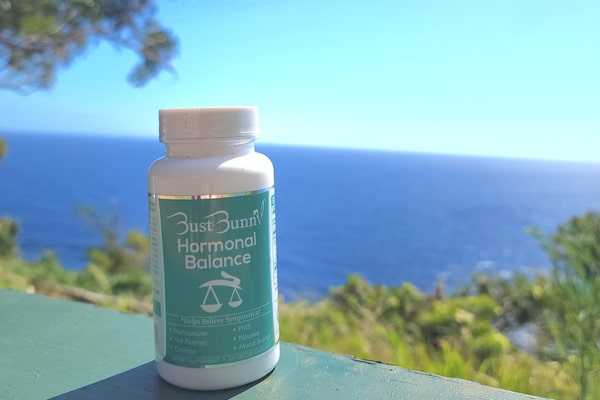
Six weeks post-delivery is the typical postpartum period, after which doctors expect hormonal fluctuations and symptoms such as night sweats to resolve themselves.
Myth Busting
Postpartum night sweats can persist well beyond your first year after delivery. The reason: Hormonal imbalance, the primary cause of night sweating, can persist for years for many women whose bodies are unable to return to hormonal equilibrium.
Your body’s inability to revert to balanced hormonal levels may be due to medical conditions or lifestyle causes.
Aside from medical conditions, which your physician should test for and rule out, there are other aspects of your lifestyle potentially prolonging the imbalance and night sweats.
Let’s briefly look at some of these lifestyle-related causes:
- Hormonal contraceptives can disrupt the production and functions of reproductive and thyroid hormones, which control most body functions.
- Chronic stress releases stress hormones that put your body in a constant fight-or-flight state, disrupting your body’s balance.
- Exposure to hormone-disrupting toxins, such as:
- BPA and phthalates in plastics
- High-risk pesticides in food and unfiltered water
- Chemical flame retardants around the home
- Parabens and MIT preservatives in personal care products
- Antimicrobial ingredients in cleaning products—for example, triclosan
- A poor diet filled with refined grains, trans fats, sugar, and other inflammatory foods causes poor gut health. This upsets the production and balance of hormones. Stimulants like caffeine will also cause stress in the body if overindulged.
- Excessive weight and hormonal imbalance form a feedback loop where the imbalance increases weight gain and the excess stored fat causes more hormonal imbalance.
So, what can you do to fix the hormonal imbalance and night sweats?
Before you reach for medication, here are simple ways to balance your hormones naturally and take back your nights:
- Take hormone-balancing herbal extracts, which don’t burden your body with synthetic hormone copies. Instead, they act as adaptogens, jumpstarting and boosting the existing mechanisms your body has to restore balance.
- Eat a nutritious, balanced diet that includes leafy greens, high fiber root tubers, fruits and grains, and fermented foods. These promote a healthy gut, essential to balanced hormone production.
- Maintain a consistent, healthy weight through a healthy diet and regular exercise.
- Sleep 7–8 hours each night at a regular time. Our bodies reset and repair during sleep. Key hormones like serotonin, which controls body temperature and cortisol, the stress hormone, require good sleep habits to function optimally and reduce night sweats.
“Goodbye hot flashes! No more night sweats, aka hot flashes! They have stopped since I started taking the Hormonal Balance.”
— Heather, USA.
Myth 3 – Postpartum Night Sweats Occur Because of Breastfeeding
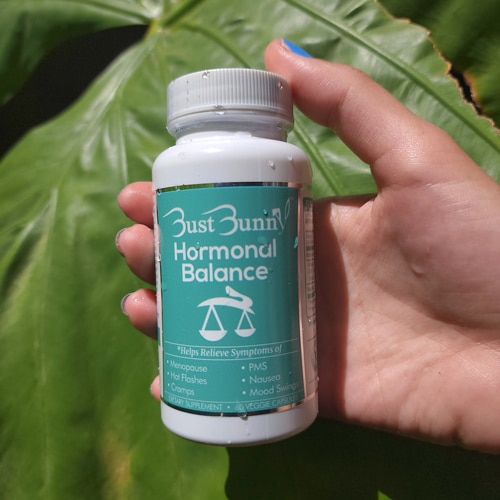
When the cause of night sweats is under discussion, invariably one of the knee-jerk answers is breastfeeding. It’s assumed that once you stop breastfeeding or wean the baby and reduce breast milk demand, night sweats will stop.
Myth Busting
Prolactin, the hormone that controls milk production, is only a small part of the hormonal imbalance.
Therefore, breastfeeding isn’t a satisfactory reason for the moms whose night sweats persist after nine months, and sometimes well into the toddler years, long after their child transitions to food.
While prolactin suppresses estrogen, low estrogen levels after birth are the major driver of night sweats.
To avoid exacerbating your hormonal imbalance and night sweats:
- Avoid or limit sugar and processed foods, which increase inflammation and throw your system out of whack.
- Reduce intake of stimulants, such as coffee and alcohol, that raise your body temperature.
- Limit stress by prioritizing good sleep habits, a relaxing bedtime routine, and time for self-care so that childcare doesn’t burn you out.
How to Restore Hormonal Balance
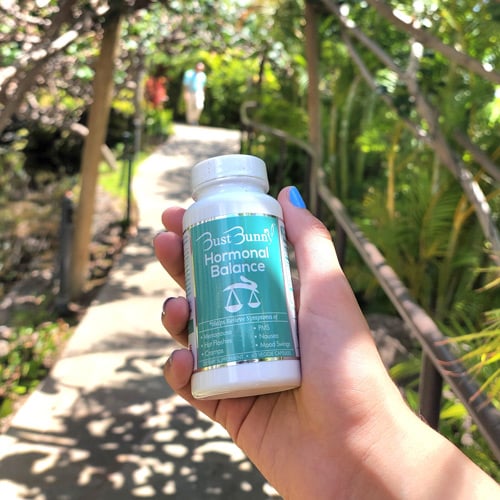
We’ve debunked the myths and looked at some of the lifestyle changes that can improve your hormonal balance.
That said, if you want to delve deeper into herbal remedies, the table below breaks down some herbal extracts to look out for in your supplements and their effects:
| Natural Herbal Remedy | Remedy Characteristic | Effect On Your Body |
| Shatavari | Contains phytoestrogen (plant-based substances that mimic estrogen) | Binds to estrogen receptors in the body, reducing the effect of estrogen deficiency |
| Vitamin E | Boosts progesterone and balances estrogen | Facilitates restful sleep and production of serotonin, key in balancing temperature |
| Ginger Root | Improves levels of estrogen and progesterone | Supports hormonal balance |
| Chamomile | Increases production of luteinizing hormone (LH) | LH triggers the production of more progesterone, which affects sleep and temperature control |
| Dong Quai (Angelica Sinensis) | Mimics estrogen | Binds to estrogen receptors in the body, supporting hormonal balance |
Get Your Night Sweats Under Control
You’re not alone in suffering postpartum night sweats, as 30% of women experience them after delivery.
Remember that every mom’s body is different and external factors like temperature or breastfeeding duration are incidental to the duration and intensity of night sweats.
The key to managing postpartum night sweats is to tackle them from their root cause—hormonal imbalance.
Now that you know how crucial hormonal balance is, take back control of your nights with Hormonal Balance from Bust Bunny.
Packed with active herbal ingredients including maca, shatavari, vitamin E, ginger root, chamomile, and Angelica sinensis, the Hormonal Balance supplement helps relieve hot flashes and night sweats by restoring your body’s natural balance.
Share on Instagram:
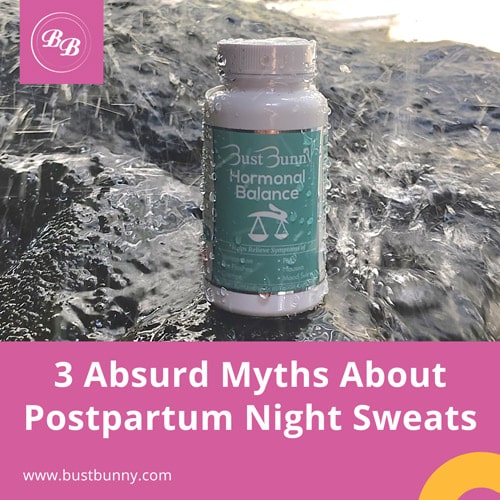
Share on Facebook:
